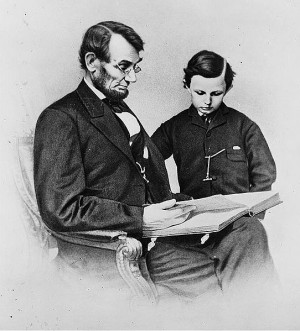Abraham Lincoln's Manful Role As a Father
Maligned by his father, he struggled to compensate with his own three sons.
 Abraham Lincoln's life has been revisited in newspapers, books, and TV documentaries during this year's [2009] bicentennial anniversary of his birth. Interestingly, little attention has been paid to Lincoln as a parent.
Abraham Lincoln's life has been revisited in newspapers, books, and TV documentaries during this year's [2009] bicentennial anniversary of his birth. Interestingly, little attention has been paid to Lincoln as a parent.
In fact, Lincoln was a truly exceptional father, who believed that his sons should be “free, happy, and unrestrained by parental tyranny.” Such a liberal philosophy of parenting allowed the president to establish a loving relationship with two of his three sons and distinguished him from most fathers of his time.
 Nineteenth-century America discouraged emotional intimacy between fathers and their children. Women, who were nurturers by nature, dominated the domestic sphere, being primarily responsible for child rearing. Men, who were defined by the authority to govern and the power to control, were drawn away from their families toward income-producing work in the public sphere. As a result, Victorian-era fathers assumed the distant roles of provider and disciplinarian for their children.
Nineteenth-century America discouraged emotional intimacy between fathers and their children. Women, who were nurturers by nature, dominated the domestic sphere, being primarily responsible for child rearing. Men, who were defined by the authority to govern and the power to control, were drawn away from their families toward income-producing work in the public sphere. As a result, Victorian-era fathers assumed the distant roles of provider and disciplinarian for their children.
Lincoln's own father, Thomas, took these roles to an extreme. Thomas was a farmer and carpenter living on the frontier. Though his frustration and poverty can be attributed to his difficult circumstances, they also fostered resentment in his son. After his wife died in 1819, Thomas left 9-year-old Abraham and his 11-year-old sister to fend for themselves in the Indiana wilderness. Six months later, he returned with a new wife to care for his children.
During Abraham's adolescence, when he assumed greater work responsibilities, his father abused him. Never fully understanding his son's desire to read and learn, Thomas berated Abraham as “lazy” and was known to “knock him over” whenever he caught him reading books. Accordingly, when Thomas Lincoln died in 1851, his son did not attend the funeral.
Lincoln's own parenting style was strongly influenced by the emotional and physical abuse he suffered as a child. As a young father, Lincoln was “constantly away from home attending to his law practice,” and was unable to develop an intimate relationship with his eldest son, Robert. But Lincoln grew as a parent. He came to understand and acted on his son's need to establish an independent identity.
While Robert's desire to enter the Union Army during the Civil War met with his mother's fierce opposition, Lincoln permitted his son to serve as an escort on Gen. Ulysses S. Grant's staff. The compromise allowed Robert to pursue his ambition while also assuring Mary Lincoln that he would not see any fighting.
Lincoln made up for the lack of intimacy with his eldest son by being more indulgent with Willie and Tad, who were much younger. Playing with his young sons became an important physical and emotional release for the president during the Civil War.
When Lincoln assumed the presidency in March 1861, Willie, 10, and Tad, 7, took control of the White House. Pet animals - including dogs, rabbits, goats, and ponies - poured into their new home. The two boys also constructed a “fort” on the roof of the mansion so they could enjoy war-related games with their playmates.
No room was off limits, not even the president's office. Cabinet members were outraged when Willie and Tad burst into a meeting and proceeded to “clamber over their father's legs.” But Lincoln was amused, and rarely disciplined them.
The gaiety came to an abrupt end on Feb. 20, 1862, when Willie died of typhoid fever. Lincoln was devastated. He and Willie shared a similar inner life. They were both extremely thoughtful to those in need, and loved to read and tell humorous stories. Willie was the only person who could cheer up his father when he seemed depressed.
“My poor boy,” Lincoln mournfully confided to one of his secretaries. “He was too good for this earth. God has called him home. I know that he is much better off in heaven, but then we loved him so. It is hard to have him die.”
At the same time, Willie's death allowed Lincoln to become more empathetic to those parents who lost sons on the battlefield. Several accounts refer to the great lengths he took to comfort those whose sons gave “their last full measure of devotion to the country.”
After Willie's death, Lincoln also became both mother and father to Tad. His wife was so grief-stricken that she rarely left her bedchamber and refused to allow her son's playmates to visit because they reminded her of her dead son. As a result, the president and Tad became inseparable. They often reviewed troops together, played together, and even slept together.
Abraham Lincoln was, for all of his other achievements, a devoted father to his three sons. Lincoln grew as a parent, just as he did as a president. In the process, he distinguished himself as a pioneer for today's fathers who take a much more active role in the lives of their children.


